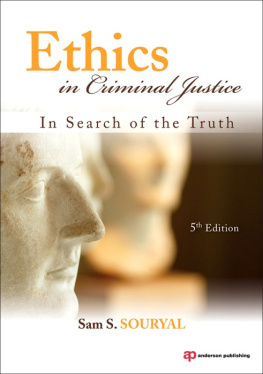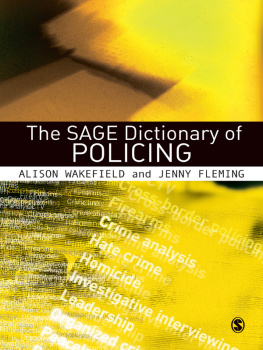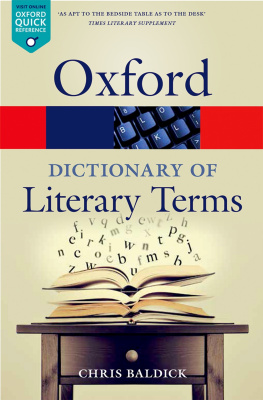First published 1998 by Fitzroy Dearborn Publishers
This edition first published in the USA and UK 1998
Published 2019 by Routledge
2 Park Square, Milton Park, Abingdon, Oxon OX14 4RN
52 Vanderbilt Avenue, New York, NY 10017
Routledge is an imprint of the Taylor & Francis Group, an informa business
Copyright 1998 by Taylor & Francis.
All rights reserved. No part of this book may be reprinted or reproduced or utilised in any form or by any electronic, mechanical, or other means, now known or hereafter invented, including photocopying and recording, or in any information storage or retrieval system, without permission in writing from the publishers.
Notice:
Product or corporate names may be trademarks or registered trademarks, and are used only for identification and explanation without intent to infringe.
British Library and Library of Congress Cataloguing in Publication data is available
ISBN 13: 978-1-57958-073-5 (hbk)
The Dictionary of American Criminal Justice: Key Terms and Major Supreme Court Cases will be useful to every student and researcher of the American criminal justice system. The book was written to enable the reader to quickly identify both key terms and leading United States Supreme Court cases in a single ready reference.
The Dictionary Section
This dictionary is not intended to replace conventional legal dictionaries, such as Black's Law Dictionary. Rather, the book attempts to pull together key terms and concepts from diverse areas, including criminology, criminal justice, corrections, probation/parole, juvenile justice, and policing. This interdisciplinary approach greatly enhances the dictionary's effectiveness as a "one stop" resource. Readers will no longer need to spend precious study time seeking out definitions in numerous specialized sources. The coverage greatly enhances the information provided in most standard glossaries, as do the examples drawn from the research literature accompanying many definitions.
In many cases, terms which refer to similar phenomena have been grouped under a single definition or a series of definitions, with minor variations to reflect slight differences in application. One feature of this dictionary is the inclusion of the names of researchers and criminologists who have done important work and influenced the nature and direction of criminology and criminal justice. It is beyond the scope of this book to include every criminologist, however. Choices were made according to which theorists are most closely associated with various key terms, issues, and theories.
The Supreme Court Cases Section
Conveniently alphabetized and indexed, the most recent and significant United States Supreme Court cases are summarized, offering an easy-to-read account of the events leading to each case, how the Court decided the case, the rationale used in the decision, and the case's significance for criminal justice.
The Supreme Court Cases section represents the most comprehensive and current assemblage of decisions to date. Especially for those who do not have immediate access to a large legal library, the cases included here are critical and have wide application and relevance. Departing from other dictionaries, in which cases are grouped under particular amendment headings or subject-matter designations, these cases have been arranged alphabetically. They have also been indexed according to important categories in order to permit those doing legal research to search out relevant and related topics more easily. A particular case may have relevance for more than one legal issue. Thus, in looking up a particular topic, the reader will find the most up-to-date cases associated with it.
The case compilation in The Dictionary of American Criminal Justice is considerably more extensive than that found in most standard texts. The coverage consists primarily of United States Supreme Court cases. This does not mean that the cases of circuit courts of appeal, state supreme courts, and district courts are not important. The opinions in this volume were chosen because they represent laws applicable throughout the United States, rather than to specific geographical areas.
The reader should note that some cases have been reported that were subsequently overturned, overruled, or replaced with new or revised interpretations. For the scholar, it is important not only to know where we are now, but where we have been in the past regarding the application of our laws. It is important for readers to understand that case law is constantly changing. The United States Supreme Court is always refining old laws and views and providing us with exceptions, increasingly specific interpretations, and modifications of previous decisions governing how the police, courts, and corrections conduct their business with arrestees, defendants, convicted offenders, and clients.
Before studying these cases, it would be useful for readers to read the discussion of case referencing under "Court Cases" at the beginning of the section. This will familiarize the reader with the abbreviations and numbers following cases and how to locate them in library collections.
While the author accepts full responsibility for any errors of fact or interpretations of United States Supreme Court cases, the criticisms and suggestions of several experts in the fields of criminal justice and criminology are gratefully acknowledged. Among those who examined the original proposal and helped to shape the project's nature and direction were: Paul Cromwell, University of Miami; Chris W. Eskridge, University of Nebraska, Omaha; Frank R. Scarpitti, University of Delaware, and Richard A. Wright, University of Scranton. Also, my thanks are extended to those who read the manuscript in its entirety and offered constructive criticisms and suggestions: Mitchell B. Chamlin, University of Cincinnati; Frederic L. Faust, Florida State University; Charles B. Fields, California State University-San Bernardino, and William Geary, University of Florida.
Dean J. Champion
Minot State University
abate. To declare null and void.
abduction. Unlawfully stealing or taking away another, with or without the use of force.
abeyance. A temporary halting of an intended or continuing action; temporary termination of action where resolution is expected. Removal is prohibited by law.
abnormal psychology. The study of behavioral disorders, including mental retardation and illness; focuses upon etiology of such disorders and examines physical and biochemical causal factors associated with such disorders.
abortion. Termination of a pregnancy by use of drugs or medical operation. Abortions are performed for a variety of reasons and are either permitted or prohibited, depending on the jurisdiction; the leading abortion case is Roev. Wade (1973).
abrogate. To abolish or annul.
ABSCAM. A 1980 federal detection of political corruption whereby FBI undercover agents posed as wealthy Arab business persons to identify politicians susceptible to bribes and other forms of wrong-doing.






